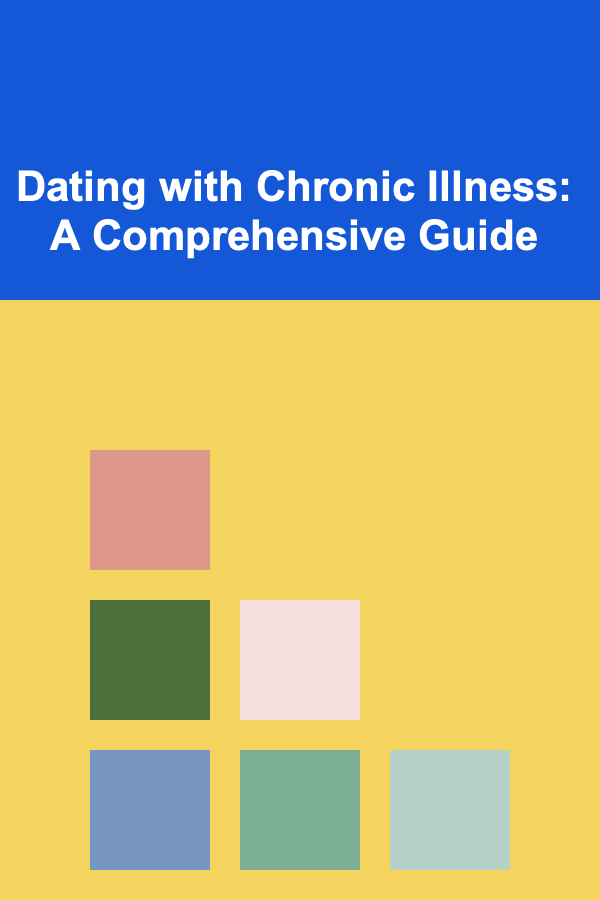
Dating with Chronic Illness: A Comprehensive Guide
ebook include PDF & Audio bundle (Micro Guide)
$12.99$9.99
Limited Time Offer! Order within the next:

Dating can be a challenging experience for anyone, filled with excitement, anxiety, and vulnerability. However, when you're navigating the complexities of chronic illness, dating can take on a whole new dimension. Living with a chronic condition like fibromyalgia, multiple sclerosis, Crohn's disease, or even long-term mental health issues, presents unique hurdles that require careful consideration, open communication, and a healthy dose of self-compassion. This comprehensive guide aims to provide insights, strategies, and support for individuals with chronic illnesses who are looking to navigate the world of dating successfully and authentically.
Understanding the Challenges
Before diving into strategies, it's essential to acknowledge the specific challenges that chronic illness can bring to the dating landscape.
1. Disclosure and Timing:
Deciding when and how to disclose your health condition can be a significant source of stress. Revealing this information too early might feel overwhelming for some potential partners, while waiting too long could create feelings of dishonesty or withholding. Finding the right balance is key.
2. Managing Symptoms and Energy Levels:
Chronic illnesses often come with unpredictable symptoms and fluctuating energy levels. This can make it difficult to plan dates, maintain consistency, and fully engage in activities. The fear of a flare-up or sudden fatigue can also create anxiety and impact spontaneity.
3. Societal Stigma and Misconceptions:
Unfortunately, societal stigma surrounding chronic illness still exists. Some people may hold misconceptions about your condition, leading to misunderstandings, judgment, or even discrimination. Educating potential partners and challenging these biases can be emotionally taxing.
4. Self-Esteem and Body Image:
Chronic illness can significantly impact self-esteem and body image. Physical changes, limitations, and the constant battle with symptoms can erode confidence and lead to feelings of inadequacy. It's crucial to prioritize self-care and cultivate a positive self-perception.
5. Emotional Toll and Mental Health:
Living with a chronic illness can take a heavy emotional toll. Dealing with pain, fatigue, uncertainty, and the limitations imposed by your condition can contribute to anxiety, depression, and feelings of isolation. It's essential to prioritize your mental health and seek support when needed.
6. Navigating Intimacy and Physical Limitations:
Chronic illness can affect intimacy and physical intimacy in various ways. Pain, fatigue, medication side effects, and body image concerns can all impact your ability to engage in physical activities and enjoy intimate moments. Open communication and creative problem-solving are crucial for maintaining intimacy within your relationship.
Building a Foundation for Successful Dating
Despite the challenges, dating with chronic illness can be a fulfilling and rewarding experience. The key is to build a solid foundation based on self-acceptance, open communication, and realistic expectations.
1. Self-Acceptance and Self-Compassion:
The most important step is to embrace yourself fully, including your illness and its limitations. Practice self-compassion by treating yourself with kindness, understanding, and forgiveness. Acknowledge that you are doing the best you can and that your worth is not defined by your health condition. This self-acceptance will radiate outwards and attract partners who appreciate you for who you are.
2. Knowing Your Needs and Boundaries:
Take the time to understand your physical, emotional, and social needs. Identify your limitations and boundaries clearly. What are you comfortable sharing with others? What activities are feasible for you? What support do you need? Knowing these boundaries allows you to communicate them effectively to potential partners and protect your well-being.
3. Prioritizing Self-Care:
Self-care is not a luxury; it's a necessity, especially when living with a chronic illness. Engage in activities that nourish your mind, body, and soul. This might include getting enough rest, eating nutritious foods, practicing mindfulness, spending time in nature, pursuing hobbies, and connecting with supportive friends and family. Prioritizing self-care will help you manage your symptoms, boost your mood, and increase your energy levels, making you a more engaged and vibrant partner.
4. Building a Strong Support System:
Having a strong support system is crucial for coping with chronic illness and navigating the challenges of dating. Connect with friends, family members, support groups, or online communities where you can share your experiences, receive encouragement, and learn from others. Don't be afraid to ask for help when you need it. Remember, you are not alone.
5. Cultivating a Positive Mindset:
While it's natural to experience negative emotions related to your illness, strive to cultivate a positive mindset. Focus on your strengths, accomplishments, and the things you are grateful for. Challenge negative thoughts and replace them with more realistic and optimistic ones. Practice gratitude daily and celebrate small victories. A positive mindset will not only improve your overall well-being but also make you more attractive to potential partners.
6. Education and Advocacy:
Become an advocate for your own health and educate others about your condition. Understanding your illness empowers you to manage your symptoms effectively and communicate your needs clearly. By sharing your experiences, you can also help to break down stigma and raise awareness about chronic illness. When dating, be prepared to answer questions and address misconceptions with patience and understanding.
Navigating the Dating Process
Once you have a solid foundation in place, you can start navigating the dating process with confidence and authenticity.
1. Choosing the Right Dating Platform:
Consider using dating platforms that allow you to specify your health condition in your profile. This can help you connect with individuals who are more understanding and accepting of your situation. Some platforms also offer filters to match you with people who share similar interests or health concerns. Be honest and transparent in your profile, but don't feel obligated to disclose every detail of your illness immediately.
2. Crafting an Authentic Profile:
Your dating profile should be a genuine reflection of who you are, both inside and out. Highlight your interests, passions, and values. Showcase your personality through photos and descriptions. Don't be afraid to be vulnerable and share some of your challenges, but also emphasize your strengths and resilience. Remember, authenticity is key to attracting the right kind of partner.
3. Disclosure Strategies: Finding the Right Time:
There's no one-size-fits-all answer to when and how to disclose your chronic illness. However, here are some general guidelines:
- Before the First Date (Optional): Some people prefer to disclose their condition in their profile or during initial messaging to avoid awkward conversations later. This can be a good approach if you're concerned about wasting your time on someone who is not accepting of your illness. However, it's perfectly acceptable to wait until you've met someone in person.
- During the First Date (Potentially): If you feel comfortable and trust the person you're with, the first date can be an appropriate time to disclose. Choose a relaxed setting and be prepared to answer questions. Keep the conversation light and focus on building a connection. Avoid overwhelming your date with too much information.
- After a Few Dates: For some, waiting until you've established a connection and built some trust is a more comfortable approach. This allows you to assess whether the person is genuinely interested in you and capable of handling the information. However, be mindful of not waiting too long, as this could lead to feelings of dishonesty.
4. What to Say When Disclosing:
When you do disclose your chronic illness, be clear, concise, and confident. Here's a sample script:
"I wanted to share something important with you. I live with [Name of Condition], which is a chronic illness that can cause [Brief Explanation of Symptoms]. It affects me in different ways, but I manage it with [Mention Treatment or Management Strategies]. I'm sharing this with you because I value honesty and transparency, and I want you to understand my health needs. Do you have any questions?"
Be prepared to answer questions and address any misconceptions. Emphasize that your illness does not define you and that you are still capable of living a fulfilling life. Focus on what you can do, rather than what you can't do.
5. Planning Dates Around Your Needs:
When planning dates, be mindful of your energy levels and symptoms. Choose activities that are enjoyable and sustainable for you. Suggest low-key options like coffee dates, museum visits, or picnics in the park. Avoid activities that are physically demanding or stressful. Be upfront about your limitations and don't be afraid to modify plans if needed. Remember, the goal is to have fun and connect with your date, not to push yourself beyond your limits.
6. Communicating Your Needs and Boundaries:
Effective communication is essential for building a healthy relationship. Be open and honest about your needs, boundaries, and limitations. Explain how your illness affects you and what support you need. Don't be afraid to ask for accommodations or to adjust plans if you're not feeling well. Encourage your partner to ask questions and express their concerns. Remember, communication is a two-way street.
7. Addressing Potential Concerns:
Your potential partner may have concerns about dating someone with a chronic illness. They may worry about the impact on their own life, the emotional toll of caregiving, or the potential for future complications. Address these concerns with empathy and understanding. Explain how you manage your illness and what support systems you have in place. Emphasize that you are responsible for your own health and that you are not looking for a caregiver. Reassure them that you are committed to building a healthy and equitable relationship.
8. Dealing with Rejection:
Unfortunately, rejection is a part of dating, and it can be particularly painful when it's related to your health condition. If someone rejects you because of your illness, try not to take it personally. It's a reflection of their own limitations and biases, not your worth. Remember, you deserve someone who accepts and appreciates you for who you are, chronic illness and all. Focus on the positive aspects of yourself and continue to put yourself out there. The right person is out there waiting for you.
Maintaining a Healthy Relationship
Once you've found someone special, maintaining a healthy relationship requires ongoing effort and communication.
1. Continued Open Communication:
Continue to communicate openly and honestly about your health needs, emotional state, and relationship expectations. Regularly check in with each other and address any concerns that arise. Be willing to compromise and find solutions that work for both of you. Remember, communication is the foundation of a strong and lasting relationship.
2. Shared Responsibilities and Support:
Create a partnership based on shared responsibilities and mutual support. Discuss how you can support each other's needs and how you can share household tasks and responsibilities fairly. If you require assistance with certain tasks, be clear about your needs and explore options for support, such as hiring help or enlisting the help of friends and family. Avoid placing undue burden on your partner.
3. Maintaining Intimacy and Connection:
Chronic illness can impact intimacy in various ways. Explore creative ways to maintain intimacy and connection, even when physical limitations exist. Focus on non-physical forms of intimacy, such as cuddling, talking, and spending quality time together. Communicate openly about your sexual needs and desires. Consider seeking professional help from a therapist or sex therapist if you are struggling to maintain intimacy.
4. Managing Stress and Conflict:
Stress and conflict are inevitable in any relationship, but they can be particularly challenging when dealing with chronic illness. Develop healthy coping mechanisms for managing stress, such as exercise, meditation, or spending time in nature. Learn effective communication skills for resolving conflict constructively. Seek professional help from a therapist or counselor if you are struggling to manage stress or conflict.
5. Prioritizing Individual Needs:
While it's important to prioritize your relationship, it's equally important to prioritize your individual needs. Encourage each other to pursue your own interests, hobbies, and friendships. Make time for self-care and individual activities. Remember, a healthy relationship is one where both partners feel fulfilled and supported.
6. Celebrating Successes and Milestones:
Celebrate your successes, both big and small. Acknowledge your progress in managing your illness and building a strong relationship. Celebrate milestones in your relationship, such as anniversaries, birthdays, and accomplishments. Remember to express your appreciation for each other regularly.
Seeking Professional Support
Don't hesitate to seek professional support when needed.
1. Therapists and Counselors:
A therapist or counselor can provide a safe and supportive space to process your emotions, develop coping strategies, and improve your communication skills. They can also help you navigate the challenges of dating with chronic illness and build a healthy relationship.
2. Medical Professionals:
Work closely with your medical team to manage your illness effectively. Be open and honest about your concerns and ask questions about treatment options. Remember, your health is your top priority.
3. Support Groups:
Joining a support group can provide a sense of community and connection. Sharing your experiences with others who understand what you're going through can be incredibly validating and empowering.
Final Thoughts
Dating with chronic illness can be challenging, but it's also possible to build fulfilling and loving relationships. By prioritizing self-acceptance, open communication, and realistic expectations, you can navigate the dating process with confidence and authenticity. Remember, you deserve to be loved and cherished for who you are, chronic illness and all. Don't give up on your dreams of finding love and happiness. The right person is out there waiting for you. Believe in yourself, be patient, and never stop advocating for your own well-being.

How to Decorate Your Home for a Festive Atmosphere
Read More
How to Interpret EV Charging Times for Different Models
Read More
How to Soundproof Your Garage for a More Peaceful Workspace
Read More
How to Start Writing from Home and Turn It into a Full-Time Job
Read More
The Art of Digital Design: Crafting Innovative and User-Centered Digital Solutions
Read More
How to Pick the Perfect Family Comedy
Read MoreOther Products

How to Decorate Your Home for a Festive Atmosphere
Read More
How to Interpret EV Charging Times for Different Models
Read More
How to Soundproof Your Garage for a More Peaceful Workspace
Read More
How to Start Writing from Home and Turn It into a Full-Time Job
Read More
The Art of Digital Design: Crafting Innovative and User-Centered Digital Solutions
Read More